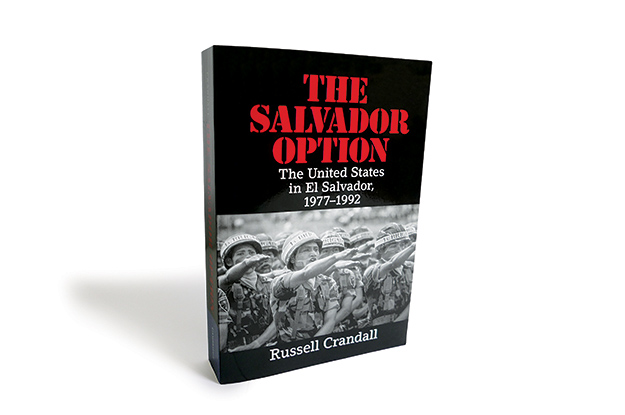Despite decades of military support and millions in development aid, for many Americans El Salvador remains a caricature, caught somewhere between an episode of Gangland and the milieu of sex, alcohol and jungle violence portrayed in Oliver Stone’s 1986 film, Salvador.
Those Americans who do spare a thought for the tiny country are prone to oversimplification. Some are quick to excuse Washington’s support for its authoritarian leadership in the 1970s and ’80s by using the Cold War to excuse all manner of sin. Others glorify leftist insurgent groups that were neither monolithic nor free from a considerable share of blame for the brutality of their country’s conflict. (Judging from his film, Stone falls into this camp.)
Russell Crandall, a professor at Davidson College and author of The Salvador Option, is not like most Americans. His book is an exercise in nuance, offering a critical and honest assessment of U.S. relations with El Salvador from the tense years preceding its civil war to the signing of the Chapultepec Peace Accords in 1992.
The Salvador Option begins with an analysis of the regional and international currents facing U.S. policymakers as they focused on Central America in the 1960s and 1970s. As left-wing movements gained ground in much of the region, El Salvador remained a secondary concern to many in the diplomatic and military establishment, who were more troubled by the possibility that Guatemala and Nicaragua would be the next “dominoes” to fall to Communism.
Successive U.S. administrations gradually came to grips with a civil war that would ultimately kill 75,000 and displace more than 1 million. U.S. support for El Salvador’s succession of right-wing, authoritarian governments most often hinged on honest assessments of the options at hand and, in hindsight, a misplaced optimism over how much U.S. support could moderate the illiberal impulses of the country’s leadership.
Equally damaging were U.S. policy choices to look the other way — as with, for example, the Ronald Reagan administration’s early denials of what became known as the El Mozote Massacre. Crandall’s study shows how individual worldviews, diplomatic machinery, and local and international politics influenced decision-makers who were often torn over the best course of action in a situation with few good answers.
The author also disabuses the notion that El Salvador can provide a test case — both positive and negative — for U.S. foreign policy elsewhere. Particularly in the context of the Iraq War, the Salvador Option, Crandall explains, came to be understood by its proponents as a militarily successful means of supporting favorable governments without significant on-the-ground U.S. involvement.
Crandall contends that the complexity and murkiness of U.S. policy in El Salvador over nearly two decades — not to mention the atrocities that took place there — should instead limit the degree to which the Salvador Option is understood as a coherent policy strategy. “U.S. backing (of the Salvadoran government) most likely made some things worse and some better — and this is before we ask whether those negative costs contributed to any lasting, positive outcomes,” he noted.
Crandall is an elegant writer and keen storyteller, and The Salvador Option covers an important but little-understood episode of the Cold War with considerable historical and analytical skill. For students of U.S. foreign policy, diplomats with an eye on Central America, or even casual film buffs wondering if Oliver Stone has any idea what El Salvador is really like, this book is essential reading.
—
Russell is an editor for AQ






